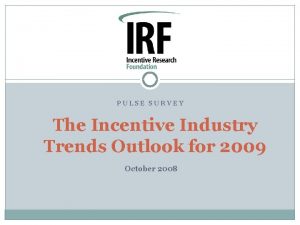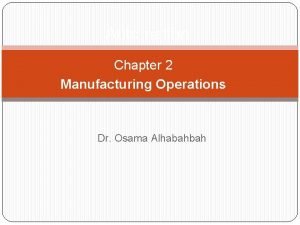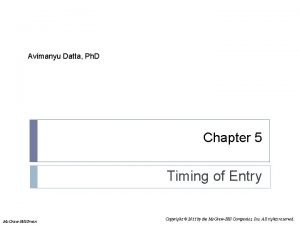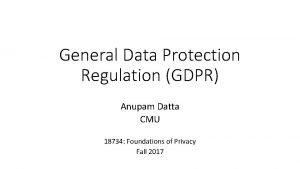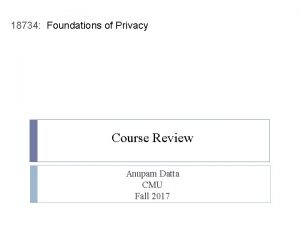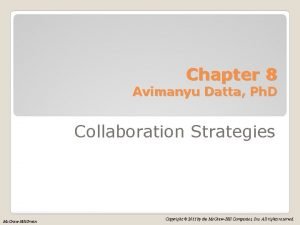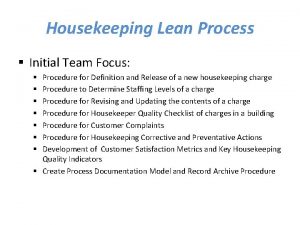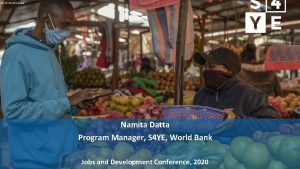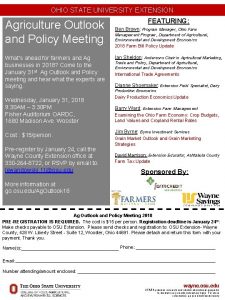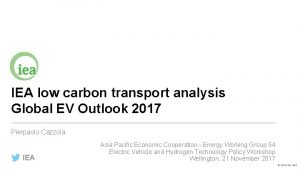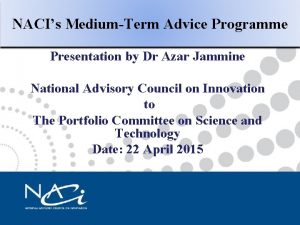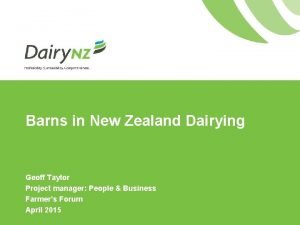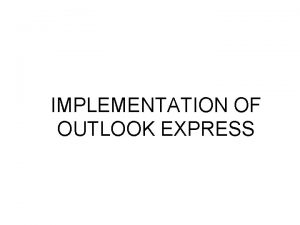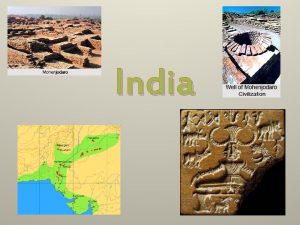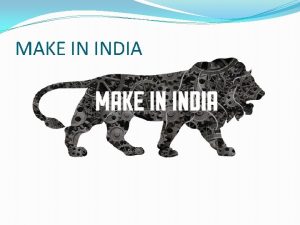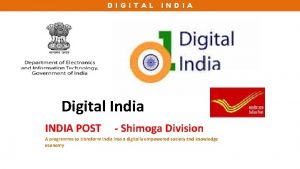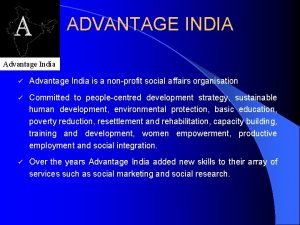Dairying in India A mediumterm Outlook TN Datta























- Slides: 23

Dairying in India A medium-term Outlook TN Datta (General Manager) National Dairy Development Board (NDDB)

Indian dairying is based on the ‘low input - low output’ model • More than 80 percent of India’s farmers are marginal or small. • They own almost 60 percent of the female bovines with only 30 percent of farm land. • About 75 percent of the animal owners own 1 -3 animals. Only 8 percent of households have herd size in excess of 4 animals. 2

Dairying in India is more than a business • Involves lakhs of small farmers, each with 1 -3 animals • Milk is the largest contributor to Agriculture GDP n n Value of milk output is Rs. 350 thousand Cr. in 2012 -13 (Paddy - Rs. 182 thousand Cr. & wheat - Rs. 131 thousand Cr. ) Contribution close to 70% of the output from livestock • While the share of agriculture is waning in GDP, the same for Livestock is almost constant • Offers relatively stable stream of round the year income vis-a-vis crop production, which is weather dependent

Value of output of milk group in India (₹ Crore) Source: National Accounts Statistics, CSO, Go. I

Dairying as a livelihood in India • Generates 5 -6% of total rural employment • Major source of rural employment, especially women employment • Major source of subsidiary income • Supports 20 -30% of rural household income • Ensures inclusive growth for rural households

Female bovine ownership in rural areas Source: Land Livestock Survey, 59 th Round, NSSO, 2002 -03

Size of herd owned in rural milieu Source: Land Livestock Survey, 59 th Round, NSSO, 2002 -03 7

Milk production & per capita availability Source: Department of AHD&F, Go. I 8

9

10

Pattern in milk consumption Domestic milk production 362 million kg/ day* Milk consumed/ used in production areas itself Surplus milk sold from production areas 167 million kg/day ~ 46% 196 million kg/day ~ 54% Surplus handled by: Unorganised Sector Organised Sector (Coop + Private+) 130 million kg/ day (33 +33) million kg/ day ~ 66% of surplus ~ 34% of surplus Based on figures for 2012 -13 of 132. 4 million tons +Surplus handled by organised private sector is an estimate

% Household reported milk consumption Source: Consumer Expenditure Surveys, NSSO, Go. I

Importance of milk in food basket Source: Consumer Expenditure Surveys, NSSO, Go. I 13

Factors influencing milk demand Rising income Urbanization Demand Drivers Changing food habits Rising milk consuming population Export opportunities 14

Milk demand Publications by different researchers and analysts indicate high projected demand for milk in the years to follow. Emerging trends indicate that milk demand is likely to be in the range of 200 to 210 million tonnes in 2021 -22. 15

Change in WPI (%) 20132014 20122013 20112012 20102011 20092010 20082009 12. 8 9. 9 7. 3 15. 6 15. 3 9. 1 Foodgrain 9. 1 14. 6 3. 6 4. 9 14. 5 11. 0 Milk 6. 0 7. 2 10. 3 20. 1 18. 8 7. 6 Veg. & fruits 23. 1 8. 3 6. 5 16. 4 9. 6 8. 2 Egg, Fish &Meat 12. 8 14. 1 12. 7 25. 5 20. 8 7. 7 6. 0 7. 4 8. 9 9. 6 3. 8 8. 1 Year Food All Commodities 16

Trade in dairy commodity 17

Milk supply and demand Projected milk supply and demand scenario leaves a gap of about 10 -20 million tonnes by 2021 -22 To bridge this gap, one of the initiatives taken by Go. I and NDDB is National Dairy Plan (NDP) I – A project funded by the World Bank 18

Why NDP I ? • The major source of growth in milk production is increase in animal numbers • Due to limited availability of resources like land, water, feed & fodder; growth in milk production may not sustain in longer run • Therefore, increasing the productivity levels of animals is need of the hour In-milk animals 51% In-milk yield 39% Interaction effect 10% Growth in milk production during 2002/03 to 2012/13 19

National Dairy Plan NDP, with a 15 year horizon, envisaged the following objective: n n Meet the projected national demand of milk through domestic sources (not imports) by increasing production at the pace required through productivity enhancement, and Strengthen/expand infrastructure for milk procurement, processing and marketing. 20

National Dairy Plan Phase I To begin with, the World Bank agreed to support Phase I of NDP for a 6 year period (2012 -13 to 2017 -18) with the following Project Development Objective: To help increase productivity of milch animals and thereby increase milk production to meet the rapidly growing demand for milk. To help provide rural milk producers with greater access to the organised milk-processing sector. These objectives to be pursued through focussed scientific & systematic processes in provision of technical inputs supported by appropriate policy and regulatory measures.

Project Components PRODUCTIVITY ENHANCEMENT a) Production of high genetic merit (HGM) bulls b) Strengthening existing semen stations / starting new stations c) Setting up a pilot model for viable doorstep AI delivery services d) Improving nutrition of milch animals through Ration Balancing and Fodder Development programme VILLAGE BASED MILK PROCUREMENT SYSTEMS a) Milk weighing, testing and collection b) Milk cooling c) Support for creating institutional structure d) Training

Thank You 23
 Outlook incentive outlook
Outlook incentive outlook Kallol datta
Kallol datta Avimanyu datta
Avimanyu datta Robert van til
Robert van til Starbucks boston matrix
Starbucks boston matrix Avimanyu datta
Avimanyu datta Anupam datta cmu
Anupam datta cmu Suprakash datta
Suprakash datta Kallol datta
Kallol datta Soumya kanti datta
Soumya kanti datta Suprakash datta
Suprakash datta Avimanyu datta
Avimanyu datta Kallol datta
Kallol datta Namita datta
Namita datta Rp outlook
Rp outlook Cloud pbx outlook add in
Cloud pbx outlook add in Osu email outlook
Osu email outlook Medical dosimetrist job outlook
Medical dosimetrist job outlook Annual energy outlook
Annual energy outlook Gbta bti outlook
Gbta bti outlook Ev tco
Ev tco Semiconductor packaging materials
Semiconductor packaging materials Besser als outlook
Besser als outlook Htpps //outlook.shd-cloud.fr/owa
Htpps //outlook.shd-cloud.fr/owa
